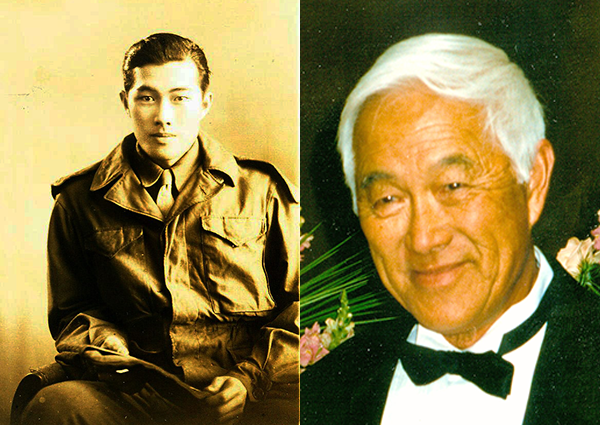Our Veterans
Allen Quin - Army
Allen Quin was born on April 14, 1925 in San Diego. He is the grandson of Ah Quin, the prominent father of San Diego’s Chinatown. Allen enlisted on Sept. 21, 1944, and after completing basic training at Camp Roberts, he spent several weeks in Hawaii for jungle training. On April 1945 his division arrived at Okinawa. On the troop ship, he saw firsthand the Japanese pilots hit the American ships before landing on the beach head. On the front lines, Allen encountered intense battles with the Japanese. At its height, a priest walked around asking soldiers if they needed anything. Allen asked to send a letter to his family. When the letter arrived, his mother read that he was near death. It wasn’t until after the war when he was in Japan that Allen was able to tell his family he was still alive. Next, Allen was involved in the mop-up operations in the northern half of Okinawa. He remembers finding Japanese food rations and thought they tasted pretty good. After the Japanese surrendered, Allen was sent to Japan where he was transferred to the Army’s 77thDivision. His assignment included escorting captured Koreans back to seaports, so they could return to Korea. On the troop train, Allen passed Hiroshima and witnessed the devastation of the atomic bomb. Allen was next assigned to the prestigious Army’s 1stCalvary. He also saw Generals MacArthur and Eisenhower at the Army’s victory parade. On November 26, 1946, Allen was honorably discharged. For his service, Allen was awarded the Bronze Star medal, the Good Conduct Medal, the Asiatic-Pacific Campaign Medal & Bronze Star Attachment, the World War II Victory Medal, the Army of Occupation Medal & Japan Clasp, the Combat Infantryman Badge 1stAward, the Honorable Service Lapel Button WWII, the Expert Badge & Rifle Bar, and the American Campaign Medal.
Wai Ock Ong (aka Jung Doon Ock or George Jung) - Navy
Enlisting with the U.S. Navy at the age of 17 and a half in 1943, Wai Ock Ong (aka Jung Doon Ock or George Jung) became an Apprentice Seaman aboard the USS Serene from June 24, 1944 to January 26, 1946. An Admirable-class minesweeper, the USS Serene was representative of some of World War II's most significant and successful naval operations in the Pacific and performed minesweeping duties during the historic invasions of Iwo Jima and Okinawa. In addition, postwar minesweeping operations in the Sea of Japan, the Yellow Sea, and elsewhere. Although Wai’s main assignment entailed manning the radar, while he was on watch, a Kamikaze crashed into an adjacent U.S. ship and sunk it. Wai and his shipmates spent the night rescuing seamen and carrying on the fight along with other U.S Navy ships until dawn. For his service, Wai received the World War II Victory Medal, American Campaign Medal, Asiatic Pacific Campaign Medal, Philippine Liberation Medal, and a Combat Action Ribbon. Wai was born in Hoiping, China on June 6, 1926 and lived in a two-story brick house on a rice farm. At 14, he left his mother and sister in China and traveled as a paper son on the S.S. Coolidge to Los Angeles then by train to unite with his father in Phoenix, AZ. While in Phoenix and enrolled in first grade he learned English and was given the name “George” when his teacher could not pronounce his Chinese name. After his honorable discharge as a Seaman First Class,Wai settled in Sacramento, CA where his father had moved. He was an inaugural member of the Chung Mei Post No. 8358, Veterans of Foreign Wars in 1946 and Ong Ko Met Benevolent Association of Sacramento in 1952. In 1953, Wai married Betty and proudly bought their house from paychecks earned at the Blue Bird Restaurant and Giant Foods Market. Wai and Betty raise four children in the house, and he lived there until his last day at age 92 and a half. He later went into a partnership to buy Santa Fe Market, working every holiday and only taking one day off a week until retiring in 1988 at age 62. He loved family outings, reading the daily newspaper, following sports, watching Jeopardy, and taking care of his yard, but most of all seeing his children and three grandchildren grow up.
Gim Yu Hom- Army
Gim You Hom, was born in Taishan, China, came to America with his father. They both lived in New York City. When WWII broke out, Hom was drafted into the U.S. Army on October, 1942 at Fort Jay, Governor's Island, New York. After basic training at Fort Dix, New Jersey, he was sent overseas to North Africa as a Rifleman with The 188th Military Police Company. He participated in The European- African- Middle Eastern Theatre Campaigns. After he suffered a bullet wound in his right elbow during The Tunisian Campaign in April,1943, he spent over a year in a convalescent hospital at Camp Upton, New York. He was discharged with Honor from The U. S. Army on March, 1945. For his bravery, Hom was awarded a Purple Heart and one Bronze Star.
After the war was over, the United States Government allow the Chinese American War Veterans to return to China to bring over to this country their wives as War Brides! As a result, Henry was born in this country as a United States Citizen! Many First Generation Chinese Born Americans in this country are here because what his father did in the Second World War!
Furthermore, his son realize that FREEDOM IS NOT FREE ! We must never, ever forget all the men and women who served this country, especially those who paid the ultimate price with their lives, so we can live in a better and free world today.



